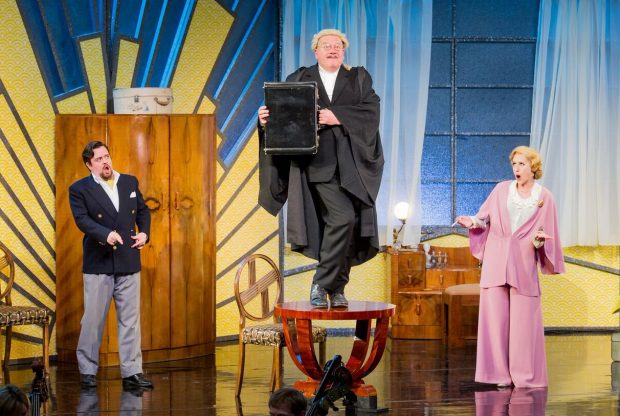Die Fledermaus
Opera Holland Park, until 5 August
Johann Strauss’s opera Die Fledermaus is a masterpiece that I have had a lifelong passion for, a passion which productions, whether in England or abroad, are obstinately determined should remain unrequited. I hadn’t seen it, until Opera Holland Park’s new production, since the 2003 production at Glyndebourne, which almost killed my passion, with its endless laborious prosiness.
All the great operas and operettas with spoken dialogue have the same problem, how to keep the interest going when everyone is waiting for the next musical item, and one would of course feel hard done by if the performance simply jumped from one to the next, as is shown in those ill-advised recordings where the spoken dialogue is omitted.
But one doesn’t want screeds of banal prose spoken by a cast sounding as if they are having an elocution lesson. There aren’t many opera singers who can speak onstage without sounding self-conscious, and among those who can none of the Holland Park artists can be included. It’s a great shame, in that they are all fine singers, some of them outstandingly so. Jennifer France, who plays the maid Adele, I’ve already seen in various soubrettish roles, and she is exceptionally good at conveying plausible but insincere pathos, setting the tone for the whole of Fledermaus.
Adele’s entrance comes after the miraculous Overture, conducted by John Rigby, whose main experience has been with musicals, as stylishly as I have ever heard it. I was prepared for an evening of bliss. But the director, Martin Lloyd-Evans, had determined that this sophisticated work should be played for belly-laughs, thus precluding humour relating to anything lower or higher – for the characters are sex-obsessed, intelligent, bored people. We didn’t even get much in the way of double entendres. To its credit, the audience on the first night didn’t even respond with conscientious guffaws, which is what Lloyd-Evans evidently wanted.
The sets are Jugendstil, so there is a Noël Cowardish atmosphere to the proceedings, and that is promising, as are the twenties costumes. Susanna Hurrell makes a commanding, lascivious Rosalinde, and though none of the men convinced me as much as the leading ladies, the cast all round is strong. If only the director had realised, or conveyed, that these people are living, if not on the verge, then towards the verge of the abyss.
Heavy-handedness is out of the question, though one variety of it is exactly what we get at OHP. But as in his supreme orchestral work, the Emperor Waltz, grandeur and fun and excitement give way, for the last minute, to the chill of dawn, so in Fledermaus the revellers are suddenly made aware that it is past time for them to go home or prison. Unfortunately Strauss, though a master of sudden disillusionment, is no good at giving it extended treatment, so there is the terrible Third Act, which really does capitulate to low prosy humour, and terribly little music.
The transience of fun has been implicit since the beginning, as it is in all this master’s work. And the brevity of happiness or what passes for it goes with the characters’ inability to feel as well as to say they feel, until, in the czardas, it is impossible to believe that Rosalinde is only posing as an Hungarian countess. Will I ever see a production which brings these things out? Not a hope, but at least there are some wonderful, famous recordings which I can listen to and imagine how they might be the soundtrack of an adequate production.






Comments